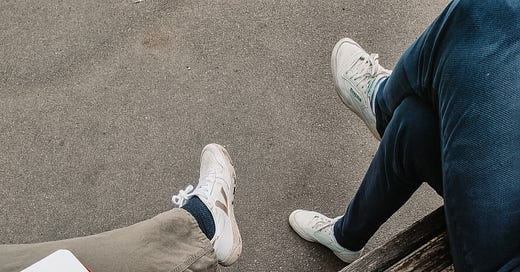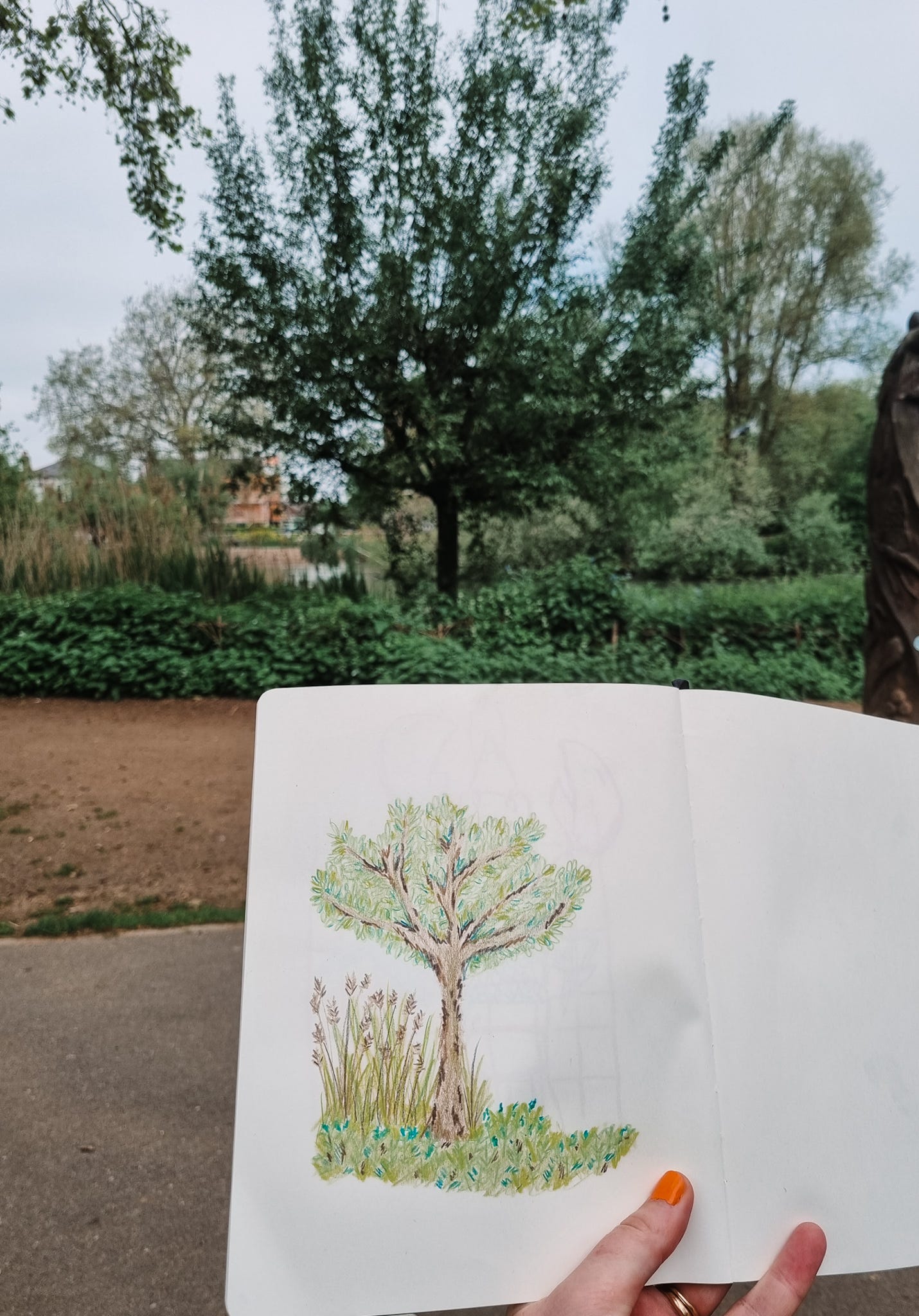How do we want (and need) to be loved?
Learnings on love from a year spent navigating burnout.
Andrew and I sat on a bench in the park by a pond at the weekend. It was sunny and warm. We could hear the elated laughter of toddlers playing nearby. Our bellies warmed with hot coffee we picked up from our favourite coffee shop on the way over, we watched the ducks paddling. I had art supplies stuffed in my tote bag, ready for us to start drawing.
The previous week I had asked Andrew if he would like to draw with me at some point. I was hopeful he would say yes, but equally non-expectant as he has always said he is not creative. I was content that by asking him I was enacting one of my biggest learnings lately: communicating my needs. For me, parallel play, especially when doing something I love with someone I love, is like heaven. I felt like my soul lit up when he said yes.
I don’t know much about romantic relationships. I was a 90s kid, brought up on American rom coms, repeatedly fed the notion that one day I would stumble across the perfect guy who would magically turn my world upside down. If I was slim enough, sporty enough, smart enough, and funny enough, maybe one day I’d have my own happily-ever-after.
I worked out pretty quickly that this is not how it works in real life. During my early 20s I had my fair share of unhealthy relationships. Having attended an all-girls school and all-girls college I was quite literally ill-equipped to navigate the ‘real’ world of dating, especially on my diet of sexist films. But the truth is, I got lucky. Really lucky. By some miracle, I found Andrew before my heart closed off for good. We were both training at a law firm in London; he was the year above me, and his office was next door to mine. He was one of the first people I said hello to on my first day. And he was the only person I looked forward to seeing every day of the five years I worked there.
I knew immediately that Andrew had a big heart. He is the kind of person that everyone gravitates towards, including me. Our love story is our own, so I’ll stop there, but what I really want to do is fast-forward and talk about how we are, together, navigating one of the most important questions that has come into focus for us during my diagnosis and burnout: ‘how do we want (and need) to be loved?’.
I have spoken many times about how a huge part of my diagnosis and burnout journey has been acknowledging and understanding that I am detached from my needs. My needs span many things, including my relationships, whether platonic or romantic. Outside of the stereotypical and superficial ‘checklist’ that my 90s rom coms suggested I make for my ideal future partner, I had not actively considered how I wanted (or needed) to be loved. Until now.
It’s funny how awakenings such as this diagnosis and burnout experience do this. They send out ripples into your life like rain on a body of water. Even if nothing is wrong with them, you start to look at facets of your life from a new perspective. You start to reprioritise. You start cultivating in new ways. It’s all part of the process, and my relationship with Andrew has not gone untouched. I have learned so much about myself and about Andrew and about the way we love each other. I know he has too (but for the sake of his privacy, I will only be discussing my reflections here).
When in crisis, nothing seems obvious or easy or straightforward. There is often no time, space or energy to zoom out and consider others or learn. It’s a case of getting through minute-by-minute. Andrew was, by every measure, my anchor during my time of crisis. He spent endless hours listening to me, he held me when I cried, and he gently questioned me with curiosity when he felt I was being too hard on myself, he cooked for me, washed my clothes, financially supported me, and helped me with daily administrative tasks. He loved me, so deeply, through the chaos of it all.
Now I’m not suggesting that our relationship is perfect, or that we navigated this storm without getting wet. No relationship is idyllic, and every relationship takes work. It’s only now that I am out of crisis and starting to come up for air that I am able to see that in navigating this chapter we have grown in our understanding of each other and how we we want to be loved. What are the things that helped us to navigate the storm, together? How do we prepare for future storms? What have we learned about ourselves and each other? How do we want to love? How do we want (and need) to be loved?
Here are my reflections on how I want (and need) to love and be loved:
Checking in: there is a difference between asking ‘how are you?’ in passing, to asking ‘how are you… really?’ with the time to hold space to truly listen to the answer without judgment, agenda, or a desire to fix anything.
Active listening: there is nothing more fulfilling than feeling like we have truly held space for someone, or to feel as though we have been heard. It requires us to leave our own experiences, triggers and opinions at the door, and listen and question with curiosity and an open-heart.
Curiosity: we all experience the world differently and can feel isolated when our world feels like an ‘unknown’ to someone else. Curiosity is what bridges the gap.
Outsourcing: no one person can fulfil all of our needs. Knowing when to outsource to friends, family, therapists, counsellors or coaches is a skill.
Communicating needs: people cannot read our mind, and shouldn’t have to try. Communicating our needs clearly and kindly allows other people to be there for us in the ways we need. This includes asking for help when we need it.
Appreciation: pausing to acknowledge and show appreciation for the way in which the people around us show up for us helps to recognise the things they do for us that we might have lost sight of.
Taking responsibility: no one is perfect, and everyone makes mistakes. Taking responsibility for them is key.
What about you; how do you want (and need) to be loved?







Acknowledging that I am capable of being loved is a hard and unfinished task on this journey, and in my life. I hope I get there. Isolation is a protective mechanism. Vulnerability has been a gateway to extremely toxic relationships.
Love this! Our daughter {recently diagnosed at 19} just asked my husband and I to start collecting something and then take part in show and tell to teach one another about our special interest. I’ll be honest, walking alongside her in her diagnosis I am making lots of mistakes and initially I wasn’t on board but within 30 seconds I changed my mind as I could see that this is something she missed out on doing without feeling anxious and scared when she was in her school years, those things were always challenging because she masked and never felt she could share the real her. My heart broke a little, yet I was also so grateful she asked us. Healing comes in many forms and maybe show and tell is one way love can help heal♥️ {her special internet is kpop and I’m still trying to decide mine but goodness it’s going to be fun}